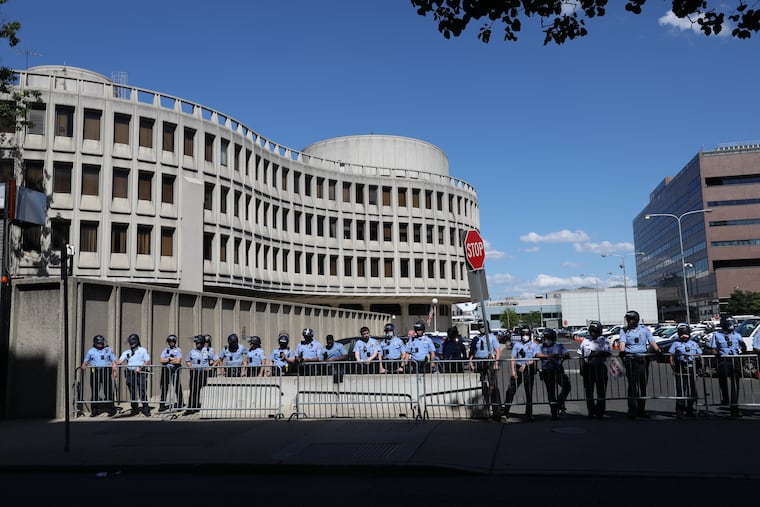Philly’s overworked 911 dispatchers are on the ‘brink of a collapse.’ City Council promises fixes.
Morale has plummeted among Philly's 911 dispatchers, a mostly female unit of civilians. Drastic change is needed, they told City Council in a virtual town hall.

Insufficient staffing. Mandatory overtime. Unsafe working conditions. More responsibilities. Less respect.
During a virtual City Council hearing Thursday, frustrated Philadelphia police dispatchers said they have been pushed to the breaking point this year as the city has grappled with the coronavirus pandemic, civil unrest, and a surge in gun violence.
Morale has plummeted among dispatchers, a mostly female unit of 220 civilians that fields emergency calls 24 hours a day.
“I’ve watched people who used to walk in with a smile continuously walk out saying they hate their life,” said Melissa Distasio, a police dispatcher from Northeast Philadelphia who has been quarantined twice due to potential coronavirus exposure on the job. “That’s how serious this gets.”
The Inquirer reported last week that over the course of the pandemic more than half of the 6,500-member Police Department has either had COVID-19 or been exposed to it, with police dispatch being hit particularly hard in recent weeks.
Internal memos show that unit had reported at least one case a week from Nov. 6 to 25, with more positive cases reported on Dec. 7, 8, and 9.
About 15 dispatchers are currently quarantined and two more tested positive since The Inquirer article, according to Darnell Davis, business agent for AFSCME Local 1637, the dispatchers’ union.
They work in close proximity to one another in Police Headquarters at Eight and Race Street, but say the Police Department has done little to address their coronavirus concerns. Most of their consoles are separated by white cardboard, not the clear plastic glass that can be found used in convenience stores. That makes communication difficult.
» READ MORE: COVID-19 surge left more than 500 Philly cops unable to work last week, department data shows
But many of the problems in the unit predate the pandemic.
Frank Halbherr, secretary-treasurer of District Council 33, which includes the dispatchers’ union, said the radio room is severely understaffed and needs between 58 and 115 additional dispatchers. As a result, dispatchers are often required to work an additional four hours of overtime per shift. There has been talk among supervisors of increasing that to eight hours.
Halbherr wants the city to hire more dispatchers and to restructure the shift system to better cover peak hours. He also said police dispatchers should be put under civilian supervisors who better understand the job, not uniformed police officials.
“You got civilians working in a paramilitary organization,” he said. “It’s difficult.”
Police communications is currently overseen by Chief Inspector Dennis Wilson, who was demoted from deputy commissioner in June after he authorized the use of tear gas on protesters on the Vine Street Expressway. Capt. Edward Appleton, who works under Wilson, runs police radio specifically.
» READ MORE: Philadelphia protesters gassed on I-676, leading to ‘pandemonium’ as they tried to flee
“The management is really bad right now,” said Davis, the union official. “We have a captain in there that has a misanthropic attitude toward civilians.”
In addition to the staffing problems, 911 dispatchers have taken on new responsibilities after the fatal police shooting of Walter Wallace Jr. in October. They are now required to ask mental health questions of all callers, leading some callers to berate the dispatchers because they feel the questions are not relevant to their emergency.
“We’re not psychologists. We’re not trained,” said Michelle Lynn, a longtime dispatcher from Wynnefield.
Lynn and other dispatchers, who earn between $39,000 and $44,000 — much less than police officers — said they increasingly feel like scapegoats when things go wrong in the department.
“It’s becoming harder to do my job,” Distasio said. “With the morale dropping the way it has, we are becoming the faceless first responders ... being treated as robots with what looks like no concern for our well-being or even a caring hello in the hallway from our captain.”
» READ MORE: Under Fire: One in an occasional series about Philadelphia’s unchecked gun violence.
Councilmembers said Thursday that they were disturbed by the problems in the radio room and pledged to make changes and find additional funding, if needed.
“This is tough to hear and it’s enraging as a parent and as a woman,” said Councilmember Helen Gym, who organized the hearing. “We know how serious it is.”
Councilmember Curtis Jones Jr. said he planned to raise the dispatchers’ concerns during coming budget talks.
“We are going to do what it takes to support this rendition of frontline workers,” Jones said. “We now expect them to be mental health professionals, to be able to assess when a 911 call needs de-escalation. We’re asking them to be able to discern those kinds of calls now, too.”
As for plastic glass dividers in the radio room, Jones said: “That should be a given.”
Cpl. Jasmine Reilly, a police spokesperson, said the department has been working to limit mandatory overtime by including supervisors as call-takers and by allowing new dispatchers to work in the radio room earlier in their training. She said Wilson, the chief inspector, has been in discussions with the dispatchers’ union to find solutions to the staffing issues.
“We will continue to work with our Police Communications Dispatchers to ensure that we make improvements to their workplace experience,” Reilly said in a statement. “Our PCDs are a valuable and essential piece of our organization, and as such, their safety and well-being is a top priority to us.”
Staff writer Jason Laughlin contributed to this article.